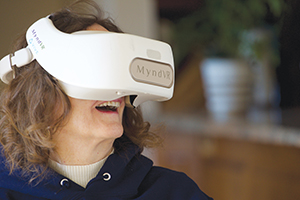By PATRICIA CORRIGAN
Adapted from the entertainment and gaming worlds, virtual reality now has applications in health care as an alternative to pharmacological treatment. Using a headset while seated, patients can experience a walk in the woods, a swim with dolphins or a tour of Paris. The distraction that these and other immersive computer-generated simulations provide has been shown to offer comfort and reduce physical and psychological pain.
Benedictine, a senior care system based in Duluth, Minnesota, uses VR therapy at four of its 30-plus care centers across the Midwest with individuals living with chronic pain, physical disabilities or dementia.

The MyndVR headset displays immersive, computer generated images such as nature videos. Benedictine is testing whether the therapy benefits elderly patients who are in physical or psychological pain.
"We're about 16 months into our first test with VR therapy, starting small, but moving fast," said Dr. Neal Buddensiek, Benedictine's chief medical officer. "Digital health aligns with what we want to be. As we work to drive excellence in supportive and palliative care, we want to find and offer more diverse non-pharmaceutical interventions."
Currently, Benedictine uses VR therapy with about two-thirds of residents at the Benedictine Living Community – Regina in Hastings, Minnesota, and has expanded its use to three other sites. They are Benedictine Madonna Meadows in Rochester and Benedictine Living Community – Red Wing, both in Minnesota, and Villa St. Benedict in Lisle, Illinois.

Buddensiek
"At Regina, VR therapy is an as-needed treatment for patients with dementia, used as a life-connecting diversion," Buddensiek said. "At Villa St. Benedict, we've set it up as a therapy that can be checked out by the assisted-living tenants." One resident noted that a VR travel experience brought back great memories; another reported loving "the adventure."
'An added intervention'
So far, Buddensiek said, VR therapy has worked for some patients, but not for others. "This is a test," he said. "Many patients are enjoying it because it helps with social isolation and with the different domains of pain — physical, emotional and psychological. I see this as an added intervention, and it's not negatively impacting anyone."
This particular test commenced in June 2019, when Benedictine signed a two-year contract with MyndVR, said to be the nation's leading provider of VR programming for seniors. Based in Dallas, the company has contracts with senior centers across the country and has reported positive outcomes from a nationwide pilot program conducted at senior living communities in New York, California, Texas, Florida and Kansas. MyndVR recently launched new studies with Stanford University and the School of Nursing at the University of Pennsylvania.

Brickler
"Basically, we've reimagined VR away from the gaming culture and commercialized it for use as a healing modality," said Chris Brickler, chief executive and co-founder of MyndVR. "We're not making health claims, but the research is promising and we're excited about aligning content models with age-related conditions so we can use VR therapy to improve people's lives."
Creating wonderment
One study Brickler cited, conducted at Indiana University, showed that patients using VR therapy in intensive care units experienced decreased delirium, less pain and enhanced mood. Tests on individuals in memory care revealed increases in "socialization, discernment and deduction" and also "an increased sense of belonging and wonderment."
MyndVR's newest content offering, released in September, is "7 Miracles," a 70-minute, immersive VR adaptation of the seven miracles of Jesus Christ based on the Gospel of John. The seven-part feature is the result of MyndVR's partnership with HTC VIVE, a VR platform. Brickler noted that Benedictine was the first senior care provider to make "7 Miracles" available, and he looks forward to expanding the company's faith-based offerings.
Buddensiek said Benedictine chose to work with MyndVR because of the diversity in the company's content library. "With that content, we have the potential to engage a resident in ways relevant to his or her life story," Buddensiek said. "In one instance, a patient's spouse told us his wife might like a VR experience of going to a piano concert. After the session she was engaged, present in the moment and spoke quite a bit about what she had experienced. Her spouse found all this remarkable, as his wife rarely spoke."
Grandson shows the way
Benedictine staff is using VR therapy for one patient with a traumatic brain injury and for another during dressing changes for leg wounds.
Buddensiek reported one unexpected victory, which occurred before COVID-19 visitor restrictions were in place.
When a patient was reluctant to put on the headset, one of her grandchildren, visiting that day, volunteered. "He loved it, and was laughing a lot," Buddensiek said. "When he finished, his grandmother said she was ready to try it, so we had some socialization there that otherwise might not have happened through this shared experience."
VR therapy can be especially useful in dementia care. As an example, Brickler noted that the agitation some patients experience as day turns to night, known as sundowning, can require extra staff time and medication. "Intervening with VR therapy before it starts can help bring consciousness back into connection with nature or music and art," he said.
Caregivers at Benedictine have reported that they consider VR therapy "a worthwhile and valuable intervention," Buddensiek said. Benedictine also provides integrative health treatment options, including music therapy, aromatherapy and therapy dolls. "Just as with our holistic therapies, with VR we are providing support and finding solutions to help with symptoms," he said.
"We're still learning and growing with this, but our hope is that a prescriptive boost of VR therapy every so often will comfort and support our residents better and provide a greater quality of life — even when they are not in the headsets."